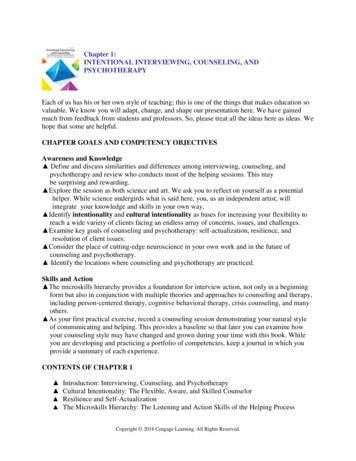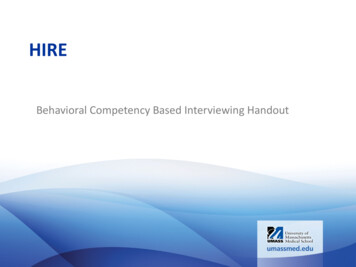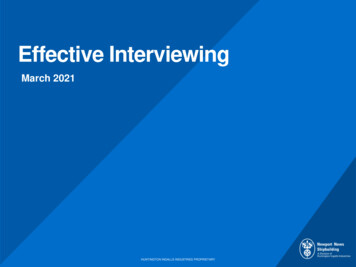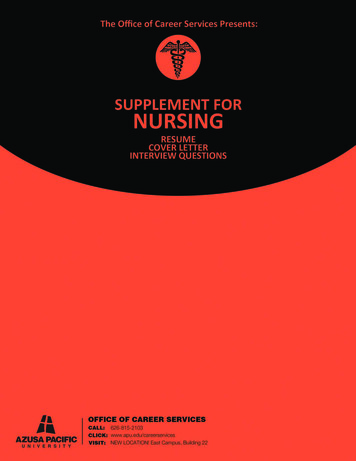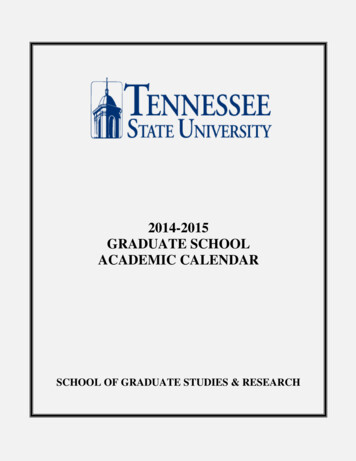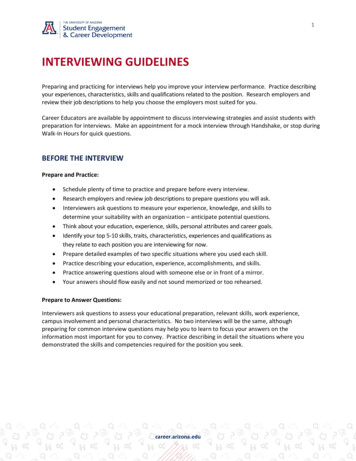
Transcription
1INTERVIEWING GUIDELINESPreparing and practicing for interviews help you improve your interview performance. Practice describingyour experiences, characteristics, skills and qualifications related to the position. Research employers andreview their job descriptions to help you choose the employers most suited for you.Career Educators are available by appointment to discuss interviewing strategies and assist students withpreparation for interviews. Make an appointment for a mock interview through Handshake, or stop duringWalk-In Hours for quick questions.BEFORE THE INTERVIEWPrepare and Practice: Schedule plenty of time to practice and prepare before every interview.Research employers and review job descriptions to prepare questions you will ask.Interviewers ask questions to measure your experience, knowledge, and skills todetermine your suitability with an organization – anticipate potential questions.Think about your education, experience, skills, personal attributes and career goals.Identify your top 5-10 skills, traits, characteristics, experiences and qualifications asthey relate to each position you are interviewing for now.Prepare detailed examples of two specific situations where you used each skill.Practice describing your education, experience, accomplishments, and skills.Practice answering questions aloud with someone else or in front of a mirror.Your answers should flow easily and not sound memorized or too rehearsed.Prepare to Answer Questions:Interviewers ask questions to assess your educational preparation, relevant skills, work experience,campus involvement and personal characteristics. No two interviews will be the same, althoughpreparing for common interview questions may help you to learn to focus your answers on theinformation most important for you to convey. Practice describing in detail the situations where youdemonstrated the skills and competencies required for the position you seek.career.arizona.edu
2Topics, skills, and competencies interviewers often question students about:knowledge in academic disciplinecareer experience (jobs, internships)goal orientation, achievement, work ethicgroup and team project experiencecommunity service and campus involvementcommunication skills (verbal and written)interpersonal skillsintegrity and ethical behavioreducation (major, classes, projects, grades)leadership and strategic decision makinginitiative, flexibility and adaptabilityteamwork and team buildinganalytical and quantitative skillsproblem solving, logic, critical thinkingtime, stress and change managementcomputer and technical skillsAssess Your Skills and Experiences:Identifying your skills will help in preparation for writing your resume and answering the typicalquestions interviewers might ask. Describe your experiences, skills, knowledge and qualifications as theyrelate to the position you are interviewing for now. Review the employer’s job description to identify theirspecific skill requirements and qualifications for the positions you are seeking. Practice talking abouthow and where you have demonstrated the required skills, competencies and characteristics throughyour education and experiences, using the skills focused STAR approach.STAR s, problems, concerns, issues, conflictsyour responsibilities and role in the situation (and who was involved)focusing on your behavior and the skills you used (and alternative actions you considered)outcomes, accomplishments, what you contributed and learned, how you were effectiveSkills-focused approach to answering interview questions: Recall 5-10 of successful experiencesIdentify 5-10 challenging experiences where things did not go as planned or you werenot pleased with your performance or the outcome.Use various situations to describe your experiences from college, jobs, internships,community service, campus activities, student involvement, class projects, teamwork,research, labs, volunteer roles, leadership roles, committees, etc Evaluate skills you used and how you were effective during each experience.Focus on measurable skills and specific examples where you can cite evidence of yourrelated skills and knowledge that you demonstrated in an experience.List your top 5 skills with two situations where you demonstrated each skill, using theSTAR method to describe what you did and how you were effective in 10 situations.Consider that a strong story demonstrates use of multiple skills in one reer.arizona.edu
3TYPES OF QUESTIONS1) BEHAVIORAL-BASED INTERVIEW QUESTIONSBehavioral-based interviews involve questions asking you for examples of past situationsdemonstrating you have the skills, competencies and work behaviors the employer wants to find in the“ideal” candidate. This popular questioning style focuses on using your past behaviors to predict yourfuture behaviors and your potential for success. Analyze the skills and qualifications required for thejob you are seeking as outlined in the employer’s job description. Identify and practice talking aboutspecific situations where you demonstrated the competencies, skills and qualifications required for theposition you are seeking.Interviewers ask for examples of past situations with positive or negative results. You may be asked todescribe a time when you contributed to a team, solved a problem, demonstrated leadership, dealtwith an ethical decision, took a risk, overcame an obstacle, etc. You will need to describe the situation,the challenge, and the outcome (how you resolved the problem or how you learned from it).Give examples using the STAR Approach to tell your story by describing the:Situation:Tasks:Actions:Results:challenges, problems, concerns, issues, conflictsyour responsibilities and role in the situation (and who was involved)focusing on your behavior and the skills you usedoutcomes, accomplishments, what you contributed and learned how you were effectiveBehavioral-based Example Questions Describe a time when you volunteered or worked as a member of a team. Describe yourrole. What did you contribute to the team?Describe an accomplishment. What did you do to make that happen? Be specific.Tell me about a time you performed well in a stressful situation. What did you do?Tell me about a time when you were not (or you were) satisfied with your performance.Describe a problem you had in a work setting. How did you go about solving it?Describe a recent problem you attempted to solve using a systematic and logical process.Tell me about a weakness you used to have. What did you do to improve that skill?Tell me what you did in your most recent volunteer experience to be effective.Tell me about a time when you took the initiative and went beyond what was expected ofyou in order to complete a work project or class assignment.Describe a time you were faced with an ethical dilemma or had to make an ethicaldecision.Describe a popular decision you made. Describe an unpopular decision you had to make.Tell me about a time when you were in a new situation -- how did you develop professionalrelationships with others? Be specific.Have you ever been on a team/group with an unproductive person? How did you handle that?Tell me about a recent time when you found errors in your work. When did you discover theerrors and how did you resolve them?Tell me about a time when you took the initiative and went beyond what was expected of youin order to complete a work project or college assignment.career.arizona.edu
42) SITUATIONAL INTERVIEW QUESTIONS You come into work and a co-worker is angry that he/she is the only member on the teampulling their weight. What would you say?How would you effectively develop relationships with your co-workers and supervisors?Be specific.You have been asked to mentor a new staff member. How would you prepare for thisresponsibility? How would you guide the new staff member?What would you do if you had knowledge of a fellow student cheating on an exam orassignment?You are a part of a team and a team member was not performing their role as expected.What would you do?How would you attempted to solve a problem using a systematic and logical process?A classmate and friend hands you a sheet of paper with upcoming exam question on it.What would you do?How would you go about suggesting an innovative idea for improving a process orprocedure to your supervisor?You are in a customer service role and must help a wide range of people from diversebackgrounds. You are assisting with an individual is not a native speaker. The individualcannot understand you. What would you do?You should up to your first day and your supervisor is out sick. What would you do? Howwould you stay productive and work effectively?3) TRADITIONAL/GENERAL INTERVIEW QUESTIONS Tell me about yourself. (related to your interest and qualifications for the job)Tell me how you meet the qualifications for this position.How has your college experience prepared you for this job?What career related skills have you developed through your education and experience?Why are you interested in working for us? What do you know about us?What involvement have you had with campus or community organizations?How would this job fit into your short term and long range career goals?How do you believe you could make a contribution to this organization?Describe the two accomplishments that gave you the most satisfaction in college.What are your top five strengths? Provide examples of each.Name three of your weaknesses (or skills and qualities you need to improve).What motivates you to put forth your best effort? What frustrates you?How do you measure success? How do you handle disappointments?Are your grades an accurate reflection of your academic ability and knowledge?Do you plan to go to graduate school? If yes, for what degree and subject?What would be an ideal job for you? An ideal employer? An ideal supervisor?What do you think about the quality of education you received at your college?Describe the three most important events during your education and related experiences.Is there anything else you want to tell me? What questions do you have for me?Why should I hire you?What strengths did your last job supervisor commend you for?career.arizona.edu
54) TECHNICAL INTERVIEW QUESTIONSTechnical questions will focus on knowledge required in the industry and focus on technical skillsand experiences. Some sample industry examples are below: Engineering: What factors need to be considered when building a traffic signal system?Teaching: What is your experience with and knowledge of standards-based education?Nursing: What procedures would you follow for a patient with fall precautions?Marketing: What process would you use to develop a marketing strategy for our new product?Film and Television: Describe your experience working on production teams.Speech: What is your experience using standardized assessments with children?PROFESSIONAL DRESSIt is important to be well dressed for interviews to make a positive impression. Prepare in advance – avoid last minute shopping in case you need time for alterations.Try on your clothes before the interview to be sure it fits and makes you look professional.Navy blue or dark gray matching professional suit in a fit that complements your bodyClassic cut suits and shined black shoes are recommendedChoose natural fabrics that do not wrinkle, such as wool gabardine.Be clean, use deodorant but not cologne or perfume.Have well-groomed hair pulled back from your face so you won’t touch it when you talk.Bring resumes, transcripts, lists of references, applications and any other documents relatedto this job in a dark portfolio with paper for taking notes and a nice pen.Tops: Wear long sleeved, ironed blouse in a complimentary color (blue, black and white aretypically safe colors) Long-sleeved, ironed white or blue cotton shirts, with cuffs extending ¼” below jacketsleeve Single-breasted jackets are more common than double-breasted Bottom tip of your tie should land in the middle of your belt when you are standing Conservative silk ties should complement suit and be as wide as your lapels (2¾” to 3½”)Bottoms: Matching shoes and belt Skirted suits are the most formal, but pantsuits are accepted for most professions Skirts should be at or below knee length (thigh should not show when sitting) Wear low heeled, closed-toe shoes Dark socks long enough that skin does not show when sitting with legs crossedcareer.arizona.edu
6DURING THE INTERVIEWPresentation and Performance:Dress professionally. Arrive early and check in 10 minutes before your interview. Turn your cell phone off – do not wait in the lobby and talk or text on your phone. Greet interviewers by name and clearly state your name when you shake their hand. Smile and maintain eye contact. Nod your head appropriately. Be poised / expressive. Have open seating positions (unfold your arms; uncross your legs; lean slightly forward). In a dark portfolio, bring resumes, transcripts, lists of references, applications and/orany other documents related to this job with paper for notes and a nice ink pen.Listen attentively. Focus and answer the questions that are being asked. Demonstrate knowledge of yourself, interest in their organization, and the right skillsfor the job. Give specific examples of past situations where you demonstrated the job skills anddesired behavioral competencies required for the position you are seeking. Be honest, friendly, cooperative, enthusiastic, positive and professional.What do you need to know to decide if you want to work for an organization? Use the information from your employer research to develop insightful questionsdesigned to show your knowledge of the employer/interest in the job you are seeking. Ask intentional questions to know about the job and the organization. Topics to ask about might include the job, management, training, and staff. Go to every interview with about three questions. Near the end of most interviews, theemployer will ask if you have any questions.Your questions can cover a wide range of topics. Examples of questions: What type of projects and assignments could I expect as a new employee? What challenges will need to be addressed first by the person you hire? What criteria and procedures are used in performance evaluations? How would you describe your management style and organizational culture? What are the goals and objectives of the company’s training program? What are your organization’s plans for expanded services or future products? What do you like most about your job and working for this organization? What do you like about living in this community?Thank the interviewer, express interest in the position, shake hands and leave. Ask about the next steps in the interviewing process and their hiring timeline. When and how should you contact the employer next? Ask for a business card. Write down what was discussed. Evaluate your interviewing skills. What worked? What could have been stronger?career.arizona.edu
7TYPE OF INTERVIEWSTELEPHONE INTERVIEWSMany employers conduct preliminary interviews with candidates by telephone. Be prepared.Your objective is to sell yourself in order to receive an invitation to an in-person interview. Prepare for unexpected calls by keeping your resume, paper and a pen by your phone.Stand up! Smile! Project enthusiasm in your voice.Speak as if the interviewer could see you!Avoid “yes” and “no” answers - provide detailed answers with specific examples.Be polite - never interrupt your interviewers when they are speaking.Write down the details if you are offered a next interview - who, where and when?Close the interview politely and thank the interviewer for their consideration of you.SECOND INTERVIEWSAfter an initial screening job interview, you may be invited to a second interview. This is a cause forcelebration because you did well in your first interview and now the employer is seriouslyconsidering you! Now, you must prepare for an even more intense interview.There are many second interview formats, including two to six individual interviews, panelinterviews, office or facility tours, testing, group activities and meals. Organizations vary greatly inhow they arrange and conduct second interviews and office visits. The length of the trip, number ofpeople who interview you, level of people conducting the interviews, types of tests conducted anddegree of formality differs with each employer. If the interview is conducted outside of Tucson, theemployer will let you know about travel and hotel arrangements and the process for reimbursing youfor expenses.Second interviews allow employers to make in-depth assessments of your qualifications to ensure agood match with your career goals. Second interviews allow you to meet additional employeeswithin an organization and learn details about the potential job. It is important for you to continueto market yourself and to have questions to ask so you may gather more information to help youdecide if you would like to work there if offered the job.TABLE MANNERS DURING INTERVIEW MEALSA formal breakfast, lunch or dinner may be part of your interview. Your hosts are evaluating yoursocial graces, dining etiquette and communication skills. Participate in the conversation by askingpertinent questions and contributing to the discussion. Stay with safe conversational topics and becautious about discussing politics, religion, health or personal issues.career.arizona.edu
8Remember your best table manners during interview meals: order food that is easy to eat with a knife and fork so you do not eat with your hands place and keep your napkin in your lap throughout the whole meal wait until everyone is served before eating and always taste your food before using salt orpepper your glasses are to your right and your bread plate is to your left pass to your right; salt and pepper always travel together - even if only one is requested only cut your food one bite at a time (never cut up all your food at once) butter one bite of bread at a time (not the whole roll or slice of bread at once) keep your elbows off the table and never talk while you are chewing to signal servers that you have finished your meal, place your silverware at the 4 o’clockposition on your plate; when you leave the table, place your napkin to the left of your plateAFTER THE INTERVIEWEvaluate and ReflectAfter each interview, evaluate what you did well and determine how you might improve in futureinterviews. Evaluate your performance to identify your strengths and weaknesses.Make each interview a learning opportunity and continuously improve your skills. Determine whatquestions you did well on and what you could have answered better. Continue to refine your answers tosupport your skills and accomplishments with specific examples.Mail or email a professional thank you letter within 24 hours to the interviewer. Mention the date ofyour interview and something that was discussed during your interview. If this was a first screeninginterview, state that you would appreciate a second interview. If this was the final interview, state yourinterest and qualifications for the position.SALARYIn preparation for your interviews, research the fair market value of your skills and experience alongwith the typical competitive salary range for employers within this industry and geographic region.As a general rule, don’t bring up compensation and benefits until employers extend you a job offer orthe interviewers brings up the topic.Not all students negotiate salaries as many employers offer new college graduates a fair startingsalary and expect to base future raises on performance. If you negotiate, the negotiation processshould be cooperative, never confrontational or adversarial. It is OK for you to ask if there is roomto negotiate, possible for the employer to say no, and alright for you to still accept the job offer.Always show that you are interested in the employer and enthusiastic about the job offer.career.arizona.edu
9The Student Engagement & Career Development print library has the NACE Salary Survey and bookson negotiating salary and cost of living indexes. NACE Salary Calculator provides an online salarycalculator by career field, degree level, and city: lculator-intro/. Salary information is included on the Student Engagement & Career Developmentwebsite, including Occupational Outlook Handbook, O*NET, Ferguson’s Career Guidance System, andGlassdoor. A salary and job offer negotiation tutorial is available online with Quintessential Careersat: http://www.quintcareers.com/job-offer-tutorial/Do your research, know the fair market salary range for the position you are seeking, practice whatyou will say, and know ahead of the negotiation what you are willing to accept. If you are asked aboutsalary before a job offer is extended, you may: Give a reasonable salary range (e.g. “With my background and qualifications I feel mycompensation would be between 46,000 and 50,000).Salary range you give should be realistic and at the fair market value based upon yourresearch of salaries in the industry, relative to your degree, level of experience andskills. Be specific.Once you receive a job offer, it is appropriate to ask about salary. You may also ask about andnegotiate other factors and benefits: start dates, signing bonuses, relocation/moving expenses,insurance, retirement, stock options, flex time, performance bonuses, vacation and sick leave, etc. Ifyou are pleased with the offer, then you might accept it as is. If you choose to negotiate the salary,the appropriate time to negotiate is after a job offer is extended, but before you accept.You are welcome to meet with a Career Educator for a Navigating & Managing your careerappointment preparing for your salary negotiations and evaluating your job offers.EVALUATING JOB OFFERSWhen you receive an offer, evaluate everything about the job, not just the salary and benefits. If youdecide to accept a job offer, it is recommended that you accept by telephone and also in writing. Does this job match your skills, interests and career goals? Will the job challenge you?Would you be working with potential co-workers and supervisors you like and respect?Are the values and culture of the organization in line with your personal perspective?Can you use your strengths and continue to develop skills through professionaldevelopment?Would you like doing this job and living in this city? Would you be happy working here?You might receive a job offer during the final interview, the next day or within 2-6 weeks after yourinterview. If you want the job, you may accept immediately in person or by telephone, but you shouldalso write and mail a formal acceptance letter. You may also ask for more time if you need more time toevaluate a job offer (2 to 6 weeks is a reasonable period of time for you to consider an offer, althoughmany employers prefer a decision from you in much less time). Asking an organization when they needyour decision about the job offer shows you are treating their employment offer seriously.career.arizona.edu
10Accepting a job offer with an employer—and then reneging on that job offer—is consideredunprofessional and unethical behavior. Accepting a job offer should be done in good faith. Once youhave accepted an employment offer, professional ethics suggest that you withdraw from furtherinterviews with all other employers. By letter or telephone, politely inform other employers who haveoffered you positions that you have accepted employment.If you have not heard from an employer by the indicated date or you have an offer from anotherorganization that requires a decision from you very soon, you may contact the human resourcesrepresentative to inquire about the status of your application and timeline of their hiring decision. Youcan then make the most informed decisions for your future. Decide what you will say ahead of time. Forexample: “Hello Mr. Morrison. I interviewed with you last month through UA Student Engagement &Career Development. I am calling to inquire about the status of my application. I am very interested inthe position with your organization and want to make sure I make the most informed decision as Iconsider my options. Is it possible to know an update on the application timeline?”You are welcome to meet with a Student Engagement & Career Development coach for assistance andprofessional guidance in preparing for negotiations and evaluating your job offers.career.arizona.edu
preparation for interviews. Make an appointment for a mock interview through Handshake, or stop during Walk-In Hours for quick questions. BEFORE THE INTERVIEW Prepare and Practice: Schedule plenty of time to practice and prepare before every interview. Research employers and review job descriptions to prepare questions you will ask.



